
Last night someone posted on a Fringe participant page taking umbrage with two awards this year: Broads’ Word Ensemble’s Beyond Bechdel-Wallace Award and LAFPI’s recognition of venues that had more than 50% female playwrights.
It struck me as a teachable moment. For those of you who may also feel that it’s unfair to have awards that only women can win- I ask if it’s also unfair to have a solo award that only a solo show can win or a musical award that only a musical can win.
Those awards have never been called out for being exclusionary- they celebrate a specific thing and that’s accepted.
Neither the Broads award nor the LAFPI’s recognition take anything away from someone. That would be unfair. What they do is award and celebrate something: in one case diversity and equality, and in the other female playwrights.
I’d like to point out that the bar for the Bechdel-Wallace test is so low that Sir Mix A Lot’s “I Like Big Butts” is generally held as an example of passing it: 2 women, named, have a conversation about something other than a man: “Oh, my God, Becky, look at her butt.”
Since women make up 50% of the world, it’s logical that we should also make up 50% of the team, the actors, and the story.
The Beyond Bechdel-Wallace award isn’t about excluding men. Yes, we asked for a woman’s story, but it could have been written by a man, with men in the cast and production team. We feel that since women are people our experiences are as deserving of being staged as any other persons. Night Witches was written and directed by the talented Will McMichael, and had plenty of scenes that don’t pass the test and it received a nomination. We want equal representation. The award is about celebrating equality and the hard work it takes to make the stage equitable- – particularly for people of color, people with other abilities, and people from a broad range of racial backgrounds; all while earning less.
Here are some statistics you may not be aware of:
Women make up 50% of the population.
Women are 68% of the theatre attending public.
Women are 72% of the students in college and university theatre programs.
And yet… women are not represented this way in theatre. (Nor film and tv but that’s a whole other post). There have been many studies about the facts in the last few years.
There are fewer roles for women
There are fewer female writers produced than male writers
There are fewer working female directors than men
There are fewer working female designers than men
There are fewer working female producers than men
There are even lower stats for people of color, LGBTQ, and other-abled.
So we offered an award to celebrate bucking the statistics and making art. I’m hoping to add money to the award next year so that winning it helps balance that budget sheet too; because that’s equitable.
So, to anyone that feels that isn’t fair… I’m sorry that you feel marginalized. I’m sorry that you feel this isn’t for you. Take a moment and think about how angry and hurt and excluded you feel. Now, take a deep breath and think about how you would feel if you always felt like this: angry, hurt, excluded. That’s where most marginalized artists create art most days. Now that you know how that feels, perhaps you can understand how important it is that we get to feel what it’s like to be included, celebrated, and awarded for our efforts. See? We have a lot in common. We’re all part of this community and we all deserve a level playing field.
-Danielle Ozymandias, Broads’ Word Ensemble Artistic Director
Resources


